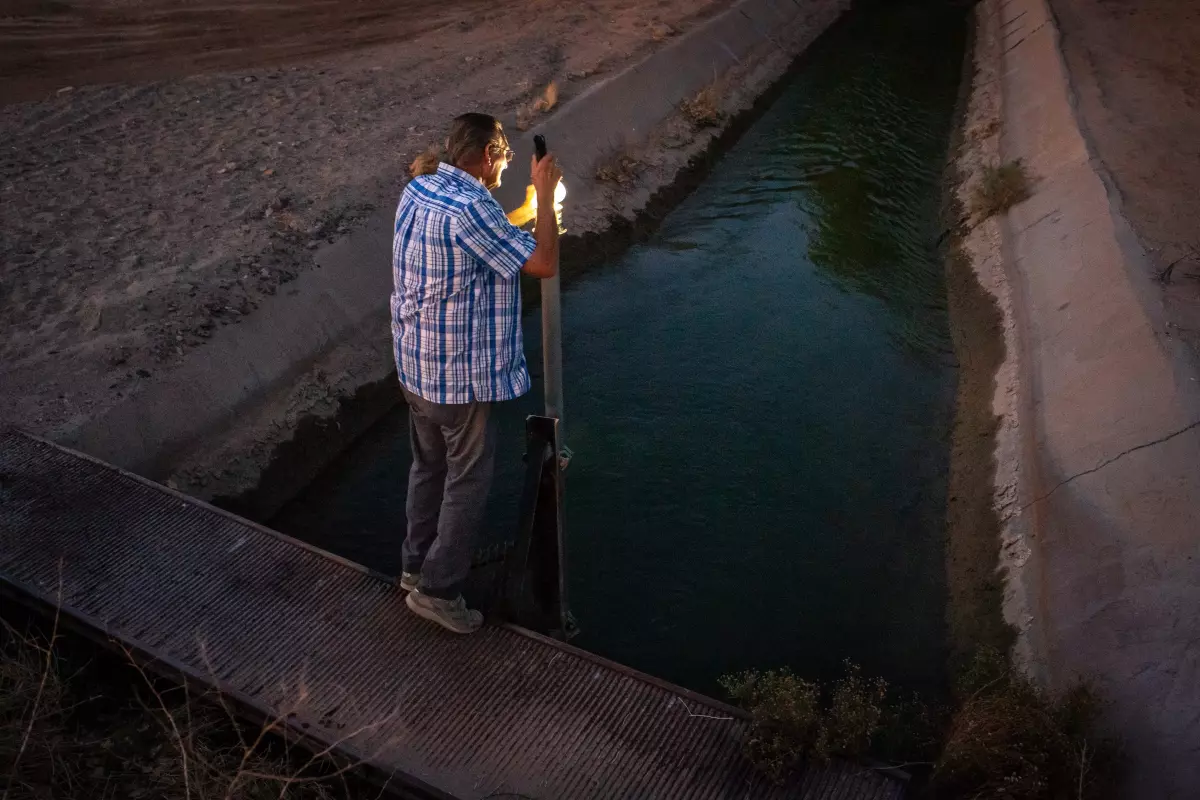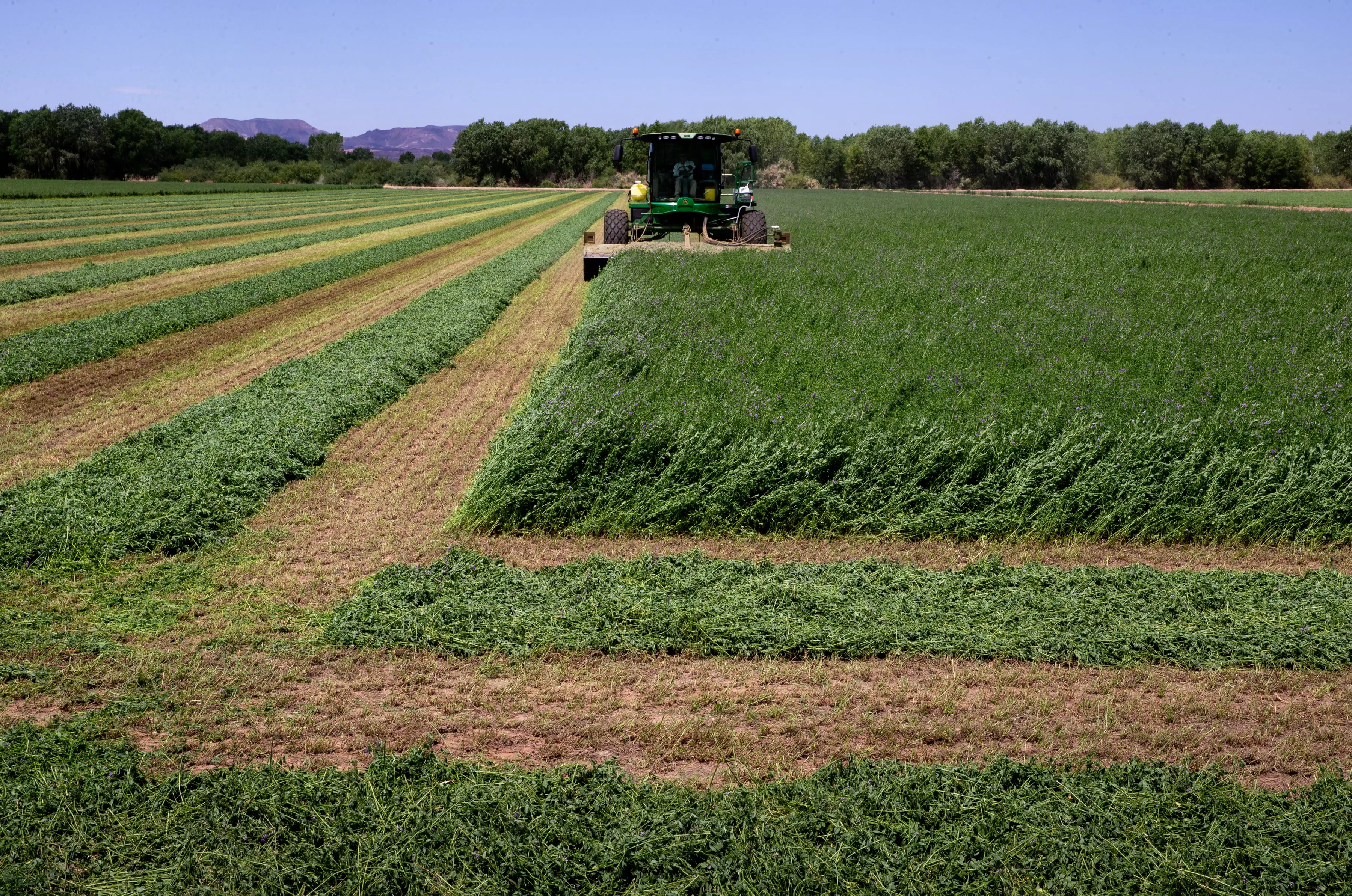In rural Arizona, a new trend has emerged in which investors are buying up farmland and selling its water to urban homebuilders. As the demand for water in the growing Southwest exceeds the dwindling supply, investors see water as an increasingly valuable asset. One particular investment company, Greenstone, has purchased nearly 500 acres of farmland and is awaiting federal approval to sell most of its water entitlement to a Phoenix suburb.
This surge in water-focused investments is driven by years of severe drought and the effects of climate change, which have led to dramatic declines in reservoirs along the Colorado River and throughout the West. As water becomes scarcer, investors are seizing the opportunity to profit by offering water to the highest bidders.
Greenstone, along with other water-focused investment companies, has been purchasing thousands of acres of farmland, with the intention of using the water to quench the thirst of growing cities and suburbs. These large-scale purchases have raised concerns among residents and local officials, who worry that these deals will leave farming towns with less water and damage their economies.
One such community affected by these investments is Cibola, a small town surrounded by farmland and a wildlife refuge. Residents fear that the proposed sale of water rights will open the floodgates for more deals along the Colorado River, ultimately leading to the demise of farming towns and the creation of a dust bowl.
While investors argue that landowners should have the right to sell their water and that free-market forces can reallocate scarce water supplies, opponents argue that water is a public resource and should not be sold like a commodity for easy profits. They believe that these profit-driven deals will only fuel more urban growth at the expense of rural communities.
As these water transfers become more common, tensions rise between those who see the potential for economic growth and those who fear the negative consequences for farming communities. The rise of private investors in water rights raises important questions about the future of water management and the balance between profits and sustainability.
 Investors buying up rural Arizona farmland to sell the water to urban homebuilders
Investors buying up rural Arizona farmland to sell the water to urban homebuilders
The Rise of Water Investors and the Challenges They Pose
Water investment firms, such as Greenstone, Water Asset Management, and Vidler Water Company, are playing an increasingly significant role in water resource management in the West. These firms view farmland with reliable water supplies as a valuable asset and aim to develop sustainable solutions to address water resource challenges.
Investing in farms with water-rich assets allows these firms to improve water efficiency and develop other sustainable businesses around these assets. For example, they may explore aquifer storage and recovery, solar development, and infrastructure improvements to irrigation systems. By partnering with farmers, they can help improve their income statements and balance sheets while providing long-term water supplies for the West.
However, these investments have sparked concerns among farmers and rural communities. They fear that these deals prioritize profits over preserving irrigated agriculture, which plays a critical role in the food supply and rural economies. Selling farmland and transferring water can lead to lost food production, dust problems, and the decline of farming communities.
To address these concerns, policymakers and investors need to consider the potential risks and benefits of water transfers. Careful planning and collaboration between private landowners, communities, and government agencies can help ensure that water trades are mutually beneficial and sustainable.
 A swather cuts alfalfa, May 26, 2021, in a field near Cibola, Arizona. The land, owned by GSC Farm LLC, will sell and transfer the water to Queen Creek, and the field will eventually go dry.
A swather cuts alfalfa, May 26, 2021, in a field near Cibola, Arizona. The land, owned by GSC Farm LLC, will sell and transfer the water to Queen Creek, and the field will eventually go dry.
The Concerns and Consequences for Rural Communities
The buying and selling of water rights have immediate and long-term consequences for rural communities along the Colorado River. While some farmers see the opportunity to profit from selling their water, others worry about the impacts on their communities and the environment.
One major concern is the potential for these deals to lead to the "buy-and-dry" phenomenon, where farmland is left dry and abandoned. This can have devastating effects on rural economies and food supplies. Furthermore, the privatization of water resources raises questions about equity and access, as water becomes a commodity that only the highest bidders can afford.
Communities like Cibola, surrounded by farmland and dependent on the Colorado River, are fighting to protect their water rights and prevent the transfer of water to urban areas. They argue that water is a shared resource that should be managed sustainably for the benefit of all, rather than being exploited solely for financial gain.
 Water master Richard Becker checks the flow meter on his morning rounds for the Cibola Valley Irrigation & Drainage District. (37 years)
Water master Richard Becker checks the flow meter on his morning rounds for the Cibola Valley Irrigation & Drainage District. (37 years)
The Need for Collaboration and Sustainable Water Management
To address the water challenges in the West, collaboration between rural and urban interests is crucial. Water investment firms, policymakers, and farmers need to work together to find sustainable solutions that balance economic growth with the long-term viability of rural communities.
Efforts should focus on improving water efficiency, promoting conservation, and exploring innovative agricultural practices that can maintain crop yields with less water. Additionally, funding mechanisms can be established to support farmers in implementing new irrigation technologies and conservation practices.
By finding ways to collaborate and support rural communities, it's possible to address water scarcity without sacrificing the economic well-being of farming towns. Private investors can play a role in this process, but their actions must be guided by a broader vision of sustainability and the preservation of water resources for future generations.
 Water master Richard Becker checks the flow meter on his morning rounds for the Cibola Valley Irrigation & Drainage District. (37 years)
Water master Richard Becker checks the flow meter on his morning rounds for the Cibola Valley Irrigation & Drainage District. (37 years)
Conclusion
The buying and selling of water rights in rural Arizona raise important questions about the future of water management and the equitable distribution of water resources. While investors see opportunities for profit, rural communities fear the harmful consequences of losing access to water. Balancing economic growth with sustainability requires collaboration, careful planning, and a commitment to preserving the long-term viability of both urban and rural areas. By working together, it's possible to find solutions that ensure a reliable water supply for all while protecting the interests of farming towns and the environment.

















